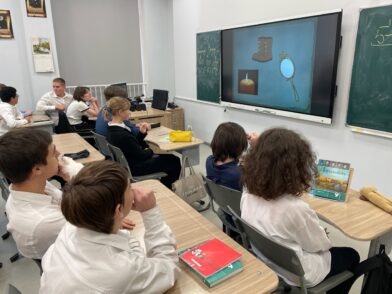23 апреля 2014 года – 450 лет со дня рождения Уильяма Шекспира. Действие «Ромео и Джульетты», трагедии, написанной в ранний период его творчества, происходит в итальянском городе Верона. Жители этого сказочного города свято хранят память о юных влюбленных. Кто только не бродил здесь, мечтая, думая о любви… Предлагаемая заочная экскурсия по Вероне поможет учителю английского языка провести увлекательный урок в старших классах, посвященный знаменитой пьесе.
Flying to Verona (Italy), one can see the Alps and Lake Garda through the window, the view is breathtaking. It puts one in a certain mood, an expectance of Beauty and Calm. A few minutes drive takes you straight to Giulietta e Romeo hotel, a wonderful home away from home in a nice quiet side-street in the old center. This amazingly beautiful town is a UNESCO Heritage Site, so there are plenty of signs and sights to see. The ancient but still functioning huge Arena is two steps away from the hotel. One can climb up and enjoy the views, as well as attend a concert in the evening. 15,000 spectators can be accommodated. The Arena faces the famous Piazza Bra, literally «Broad Square». It is a hub of activity, with lots of cafes, restaurants and souvenir shops. One of the best-known attractions, of course, is Casa di Giulietta, Juliet’s House. Yes, we all know it is probably a myth, but what a lovely one! People are always milling around there, to see the balcony, to write love messages on the wall in the little specially designated place in front of the yard. The panels are washed and changed once they are filled in. It is a bit difficult to get a picture of the famous balcony since there are always people there, but one can do it with patience. The immortal scene from Shakespeare’s play comes to mind. Visitors traditionally touch Juliet’s statue for luck. It is polished as high as people’s hands can reach. Inside the house, one can see the furnishings from the era described in the immortal play. Actually they come from the set of the famous film made by Franco Zeffirelli in 1968. In Italy, Juliet is the one who is always in the center. She is regarded as a symbol of young passion, a courageous young girl who dared to overcome all the prejudices of her epoch in the name of love. The ending of the play in the original is, «For never was a story of more woe Than this of Juliet and her Romeo». Walking in a different direction, one finds Juliet’s Tomb, which is not quite what it says, but it is a pretty house with garden and an actual bronze sarcophagus in the basement. The Bard himself occupies a prominent place in the city, too. One can see his statues, quotes from his play, and various memorials to his young heroes everywhere. There are touching lovely statues in cafes and restaurants, in the streets and squares. Near Juliet’s Tomb one can see an amazing white monument donated to the city of Verona by China in 2003. It creates an impression of light and flight, and brings tears to anyone’s eyes.There is the customary shopping street near Juliet’s House, with all the familiar shops and boutiques, if one wants to go shopping. One can buy cups and plates, pictures and miniature statues, books and films, all devoted to the same theme. Piazza d’Erbe houses the market, and there are plenty of cafes and restaurants on it. One can climb up the tower and enjoy the surrounding views. Lots of churches, basilicas, the cathedral all deserve a visit. In addition, there are several impressive castles, lots of bridges and gardens. The mountain river Adige looks amazingly clean, and the air is very fresh and cleansing. Magnolia trees and olive groves are another pleasant feature. Walking around this lovely town, one can understand why generations of writers, composers, artists visited it, and why it is a popular tourist destination today.Прим. ред. Большой материал Нины Коптюг с комментариями к тексту трагедии Уильяма Шекспира «Ромео и Джульетта» и переводом трудных мест читайте на сайте «Учительской газеты» http://www.ug.ru/method_article/787 Нина КОПТЮГ, кандидат филологических наук







 Выбор читателей
Выбор читателей






Комментарии